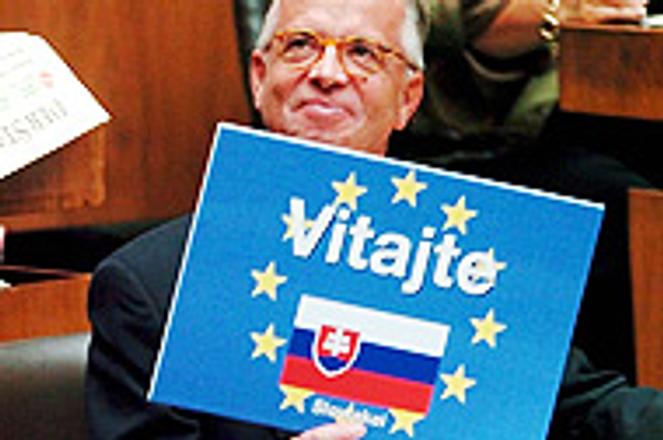Dzurinda keen on integration; Slovakia remains committed to a successful unionphoto: TASR
THE FAILURE of European leaders to agree on an EU constitution left many observers worrying about the fate of the integration of an enlarged union. If current tensions lead to the creation of a two-speed Europe, Slovak representatives want to see the country on the faster track.
Heads of state from the 15 current member states and ten acceding countries met in Brussels on December 12 and 13 to discuss a draft constitutional agreement, intended to define the role of an enlarged union, govern the competencies of its institutions, and make it more transparent for European citizens.
The European Convention, a forum for state representatives of all 25 EU countries that started its work in February 2002 and finished this July, prepared the document. An Intergovernmental Conference, launched on October 3, was to resolve all remaining open issues in order for European representatives to conclude the agreement at the Brussels summit. However, that plan failed.
"Today it was not possible to reach an agreement," said Romano Prodi, President of the European Commission at the final Intergovernmental Conference press conference.
"Any deal would have been below expectations and no one wanted that. Now we need to stop and think carefully and put our ideas in order. It would be pointless and ungenerous to try and blame any individual delegations. We were all of the opinion that an agreement that fell below expectations was not in Europe's interest," he added.
Although country delegations managed to find a compromise on most open questions, the sticking point was the decision-making mechanisms in the union. Germany and France favour a system granting them more weight based on the larger size of their populations, Spain and Poland press for the current way of voting to be preserved.
This was not the first time that these countries took opposing sides over the last months. While France and Germany, both members of "old Europe", were opposed to the war on Iraq, Spain and Poland stood firmly behind the US.
Poland, widely seen as the Trojan horse of US interests in Europe, now controls one of the three coalition sectors in Iraq, while the Germans and the French were even excluded from the opportunity of bidding on major reconstruction contracts by the US Department of Defense.
Berlin and Paris alienated many in late November when they announced that next year they would again violate their obligations under the Pact of Stability and Growth and exceed the budget deficit allowed by European legislation. Moreover, the two have so far always escaped sanctions for their benevolent approach to the economic rules of the union.
Prime Minister Mikuláš Dzurinda, who expressed his disappointment at the collapse of the summit, also refused to blame any specific country.
"It would not serve good bilateral relations to accuse any one country," he said.
The Slovak delegation, although it did leave for the conference with a defined set of demands, made it clear from the start that it would not endanger the success of the summit by its unwillingness to compromise.
"I was ready to accept the agreement, which was excellent for Slovakia. However, I have to respect that there are 25 of us," he said.
Immediately after the results, French and German leaders announced that a bloc of six founding countries of the European Community - France, Germany, Belgium, Holland, Luxembourg, and Italy - might create a "first speed" Europe.
"It would be an engine that would enable Europe to proceed faster, further, and better," said French President Jaques Chirac after the EU meeting.
The countries would most likely cooperate more closely in the fields of defence, economy, and justice. A similar model of separate progress is already applied in two crucial areas - the introduction of the euro and elimination of internal borders. Not all EU members have opted for both.
The launch of any separate initiative of some current members is expected in the upcoming months, if the current deadlock proves to be impossible to overcome.
PM Dzurinda said that if such a project is launched, Slovakia "wants in".
However, some critics at home are more cautious about rushing into the new approach.
"If [the EU] is divided between old and new, big and small, it cannot be a success," said former chief negotiator with the EU and current head of the parliamentary foreign affairs committee Ján Figeľ to the private SITA news wire. Figeľ is a candidate of the Christian Democratic Movement for Slovakia's commissioner to the European Commission.


